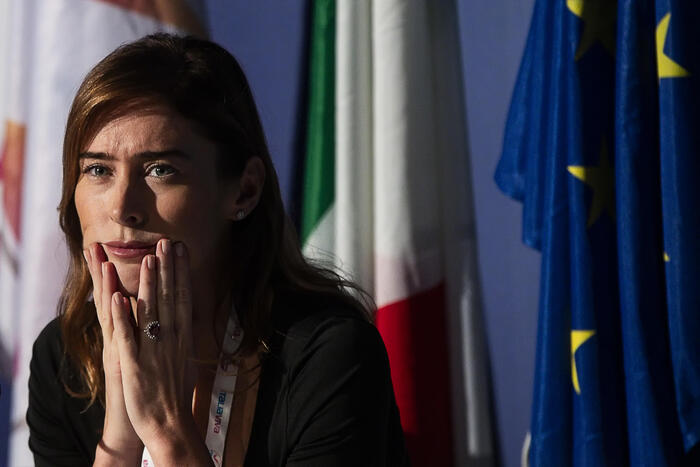His decision is eagerly awaited: the Supervisory Board of Facebook will decide whether Donald Trump can return to the social network.
Last January, the former president of the United States was banned from the platform for "
inciting violence
".
In question ?
Messages encouraging and supporting his supporters after the assault on the Capitol in Washington, the day of the certification of the victory of Joe Biden in the presidential election of November 2020. Facebook has temporarily banned access to the network to Donald Trump, for having broken the rules of his platform.
The social network has entrusted its Supervisory Board with responsibility for the final decision.
What is this Supervisory Board for?
It was introduced in November 2018 by Facebook CEO Mark Zuckerberg. The goal ? Decide on sensitive decisions on the moderation of its platform, which has been criticized for a long time on this subject. Created in May 2020, this Supervisory Board is similar to a “Supreme Court”. It can be seized by any user of Facebook or Instagram, if he considers himself aggrieved by a decision of moderation of the social network against him. The Council has the power to decide whether these two platforms should allow or remove content. Not being able to process everything, its members assess the relevance of requests and select eligible cases. These are often complex and important cases, which require careful consideration and may give rise to a form of case law,like the case of Donald Trump.
What is the procedure ?
Once the case has been selected, a group of members is assigned to it.
He receives information allowing him to deepen his examination.
These include information shared by the caller and contextual data from Facebook, in accordance with applicable legal restrictions.
Then the jury deliberates and renders its decision, which must be approved by a majority of the Council.
It is enforceable, that is, Facebook is obligated to implement it, unless doing so risks breaking the law.
In addition to this judgment, the body can give a non-binding opinion.
For example, it can include a policy recommendation for Facebook, which is not obligated to follow it.
Read also: Trump banned from Facebook: "It's not up to GAFA to decide what to say or not to say"
This Council officially began its work on October 22, 2020 and received more than 300,000 calls. Very selective, it has rendered only nine decisions, each of which is published and archived on the website. Among them, Facebook had to put online publications from American, French, Burmese, Brazilian and Indian users that it had deleted. So far, the Supervisory Board has focused on the content removed by the moderation teams. Since April 13, he can look into the content that the moderators did not see fit to censor. Concretely, the Council "
now accepts cases of Facebook and Instagram users who believe that the company has wrongly allowed harmful content to remain on its platform
".
Internet users therefore have the possibility of denouncing hateful, racist remarks, calling for violence, or spreading false information on the health crisis, which have remained online despite reports.
Eligible are posts, status updates, photos, videos, comments and shares.
Is this Council really independent?
This "
Supreme Court
" is funded directly by the social network. It plans to inject $ 130 million over six years, an operation that questions its independence. Thomas Hughes, the administrative director of this body, defends himself: “
Even if the funding comes from Facebook, this money was given to a separate trust. It is marked only to be used by the Council. »
Regarding its missions and principles, they have been defined in advance in a charter, so as not to bias decisions. Five key values are put forward: freedom of expression, deemed "
essential
By the Council, authenticity, security, respect for private life and the right to dignity.
International human rights law is also essential for delivering judgments.
Who makes up this Council?
In order to make these decisions, Facebook helped kick off the member selection process, choosing four co-chairs.
They then selected sixteen additional people, unveiled on May 6, 2020. They are personalities from civil society, of different nationalities and unrelated to Facebook.
Members "
are not employees of Facebook and cannot be revoked by Facebook,
" says the site.
To read also: For Facebook, 2021 does not promise to be serene
Among the personalities, the best known is Helle Thorning-Schmidt, former Prime Minister of Denmark. Beside her are Alan Rusbridger, former editor-in-chief of the British daily
The Guardian
, Michael McConnell, former judge at the United States Court of Appeal, and Tawakkol Karman, the first Arab woman to win the Nobel Prize for the peace in 2011. “
We come from different cultures and backgrounds and have different views and beliefs, and this diversity is at the heart of our efforts,
” said Thomas Hughes. Twenty more people will join the team by the end of the year. They will be named directly by the members and not by Facebook.
For Evelyn Douek, professor at Harvard, this Council represents "
one of the most ambitious constitutional projects of the modern era and a key moment in the history of the governance of freedom of expression online
".









